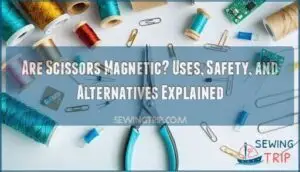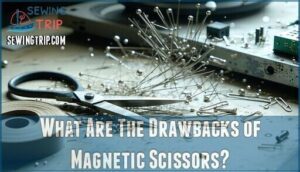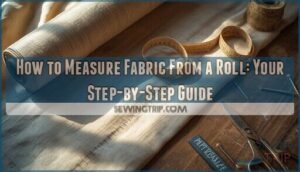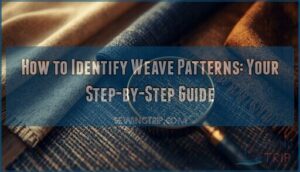This site is supported by our readers. We may earn a commission, at no cost to you, if you purchase through links.

The blades can even hold onto small metal items, which makes magnetic scissors surprisingly handy in sewing rooms and school projects. But every silver lining has its cloud; these magnets can sometimes create workspace clutter or play havoc near electronics.
Want to know how to get the perks without the pitfalls? The answer’s right around the corner.
Table Of Contents
Key Takeaways
- Most scissors are magnetic because they’re made from ferromagnetic metals like iron or certain stainless steels.
- Magnetic scissors can attract and hold small metal items, which is helpful for tasks like picking up pins but may also cause workspace clutter or interfere with electronics.
- Using magnetic scissors requires regular cleaning, careful storage away from magnets and electronics, and extra caution around children to avoid safety risks.
- Non-magnetic alternatives such as titanium or ceramic scissors provide similar cutting performance without the drawbacks of magnetism.
What Are Magnetic Scissors?
Ever wondered why some scissors seem to grab onto pins and needles as if by magic? Magnetic scissors get their power from ferromagnetism, explained by the composition of their blades—usually iron or a magnetic grade of stainless steel.
Through a magnetization process or simple storage near magnets, these scissors develop magnetic properties, making them handy for quickly scooping up metal objects around your workspace.
What Are The Benefits of Magnetic Scissors?
Magnetic scissors offer a handful of handy perks that might surprise you. Here’s what makes them stand out.
Benefits of Magnetic Scissors
Magnetic scissors can add an unexpected boost to your everyday routine, offering several practical—and sometimes surprising—advantages:
- Enhanced therapeutic applications—occupational therapists see stronger engagement and better fine motor results.
- Noticeable educational advantages for children, especially in STEM classrooms.
- Excellent industrial efficiency during precision tasks and laboratory work.
- Well-designed accessibility features and safety improvements, supporting safer tool use no matter your skill level. Scissor use helps children develop essential fine motor skills.
– Pick Up Pins and Needles
After noticing the boost in precision cutting or organization, you’ll quickly appreciate another advantage—quick pin retrieval. When you’re scattered by runaway sewing needles or tiny metal bits, magnetic scissors turn cleanup into simple magnetic sweeps.
Use the table below to compare benefits during sewing:
| Keyword | Application |
|---|---|
| Pin Retrieval Ease | Fast pin pickup |
| Needle Organization | Keeps needles clustered |
| Magnetic Sweep | Cleans small items |
| Fabric Pinning | Holds pins for you |
| Sewing Safety | Fewer stray needles |
– Fun for Kids
That thrill of sweeping up pins often turns into a playful experiment for your kids. With magnetic scissors, children safely explore how magnetism works—boosting their curiosity and control. Think of these as both a classroom staple and a kitchen-table conversation starter.
- Kids Safety
- Creative Play
- Learning Magnetism
- Interactive Tools
- Sensory Exploration
– Improve Fine Motor Skills
Practicing with magnetic scissors strengthens grip and encourages bilateral coordination, as both hands must work together with care. These scissors introduce tactile sensory input that sharpens dexterity development and hand-eye coordination—tools essential for tying shoes or writing.
Safety scissors, designed for comfort, offer just the right resistance, helping muscle memory formation flourish throughout fine motor skills activities.
What Are The Drawbacks of Magnetic Scissors?
Even with their quirky charm, magnetic scissors come with real drawbacks. They don’t just attract pins—they pull in every stray metal bit, often cluttering your workspace and creating object attraction issues. If you’re working near computers or electronic devices, magnetic scissors can cause electronic interference, posing subtle but serious risks to sensitive equipment.
Magnetized scissors can even require a demagnetization process to function correctly. Child safety can be a concern too: tiny magnetic scissors and loose fragments mean potential choking hazards for little hands.
Plus, magnetic scissors demand more maintenance to avoid rust and keep cutting true, as debris clings to the blades and alignment suffers. For anyone aiming for precision, magnetic fields can subtly tug at your grip, undermining the fine motor control you rely on for detail work.
- Increased clutter from debris and pins
- Interference with electronics
- Greater maintenance and safety risks
How to Use Magnetic Scissors Safely?
When you reach for a pair of magnetic scissors, a little bit of caution can go a long way in keeping your workspace safe and frustration-free.
For pace sensitivity and child safety, here’s how to use magnetic scissors safely:
- Wipe blades often to prevent metal buildup.
- Store away from electronics to avoid device interference.
- Keep out of reach from curious kids.
Alternatives to Magnetic Scissors
Looking for a smoother solution than magnetic scissors? Imagine cutting fabric or paper without the nuisance of pins sticking to your blades or worries about damaging your digital sewing machine. Alternatives to magnetic scissors have grown both ingenious and practical, taking into account everything from material science to user comfort.
- Titanium Scissors and Cobalt Alloys: These nonmagnetic scissors are a staple in crafting and sewing, engineered to avoid attracting stray metal and remain safe around sensitive electronics.
- Ceramic Blades and Plastic Alternatives: Designed for durability and precision, these options excel for both everyday tasks and environments where you need rust-free, lightweight, and non-magnetic performance.
- Adaptive Designs: From spring-loaded grips to easy-grip mechanisms, today’s scissors accommodate every hand, helping crafters of all ages and abilities cut with confidence.
Choosing the right tool transforms frustration into satisfaction.
Frequently Asked Questions (FAQs)
Are scissors magnetized?
You might think your scissors are just innocent tools, but sometimes the magnetic properties of scissors can sneak in uninvited.
Scissors can become magnetized due to their steel composition, nearby magnetic field strength, or even careless storage.
Can scissors be stored near a magnet?
Storing scissors near a magnet may seem harmless, but over time, Magnetic Field Exposure can cause Accidental Magnetization.
Over time, this can lead to subtle but lasting changes—like magnetized blades or even a risk of losing their original magnetic properties—impacting both how the scissors work and the best way to store them.
Can a steel scissor become a magnet?
Curious how steel scissors can turn into magnets? Through ferromagnetism explained by scientists, steel’s magnetic domains align when exposed to strong magnets, changing its magnetic properties.
Steel magnetization results from composition and can be reversed using demagnetization methods.
Do magnetic scissors attract metal objects?
Imagine you’ve dropped a handful of pins—how do magnetic scissors respond? Depending on their magnetic attraction strength and the metal object’s size and material composition, magnetic scissors can attract and hold small ferrous metals within close distance.
Can you use magnetic scissors on electronics?
Ever wonder if magnetic scissors belong near electronics? Even a weak magnetic field carries a Device Interference Potential and Data Corruption Threat for sensitive electronic components.
To steer clear of electronic damage, keep a safe distance, consider adding shielding, or—if it’s easier—just demagnetize those scissors.
Can you use magnetic scissors on a sewing machine?
Even a tiny magnetic field can spell trouble for computerized sewing machines, leading to malfunction or costly repairs.
Using magnetic scissors near such machines is risky—magnetic field interference and accidental attraction of small metal items can cause sewing machine damage.
Are magnetic scissors safe for children to use?
Magnetic scissors for children might seem clever, but child safety risks outweigh any creative benefits. The magnetic pull can lead to finger pinching or injury, and if magnets detach, choking is a concern.
Age appropriateness and close supervision matter.
Can magnetic scissors be used with computerized sewing machines?
Like a storm cloud over delicate circuitry, bringing magnetic scissors near computerized sewing machines carries real computer damage risk. Magnetic field interference could corrupt data or void warranties.
Always follow safe distance guidelines and use non-magnetic alternatives for sewing.
How do magnetic scissors work?
You’ll notice magnetic scissors can grab pins or needles. That’s because their ferromagnetic materials have aligned magnetic domains.
This magnetization process creates a magnetic field strong enough to attract metal items, highlighting both convenience and potential drawbacks.
Are there any specific care instructions for magnetic scissors?
Treat your magnetic scissors with careful cleaning—hand wash using warm, soapy water and dry thoroughly to avoid rust.
For added safety, store your scissors well away from other magnets.
Make it a habit to check their magnetic strength so you can catch any loss or potential damage early.
Conclusion
Who knew sorting your workspace could come down to a scissor’s secret life as a wannabe refrigerator magnet? While the answer to "are scissors magnetic" may leave you checking your tools, the real magic is in how you use them.
Whether you let scissors snatch up pins or stick with non-magnetic alternatives, making informed choices keeps your projects tidy and safe. Next time you reach for a pair, you’ll know exactly what’s in their metal.
- http://www.designlife-cycle.com/scissors
- https://www.shungwei.com.tw/about-products.htm
- https://nationalmaglab.org/magnet-academy/plan-a-lesson/magnetizing-and-unmagnetizing/
- https://pmc.ncbi.nlm.nih.gov/articles/PMC11205382/
- https://www.reddit.com/r/explainlikeimfive/comments/1ld7tn/eli5_why_do_metal_scissors_turn_magnetic_after_a_w/









